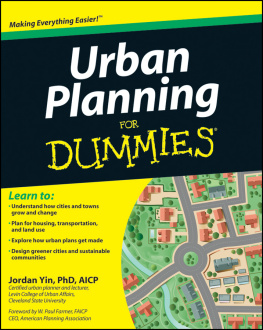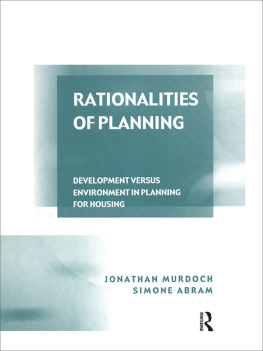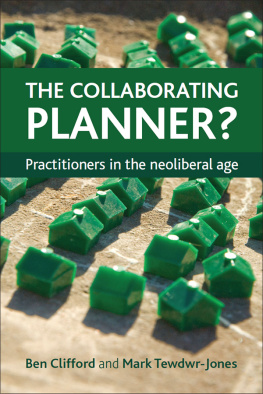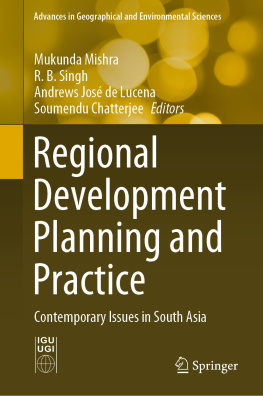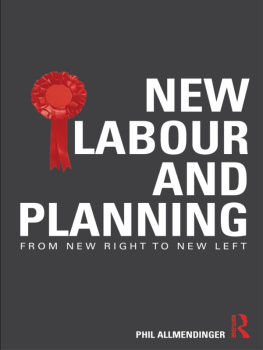THE CHANGING INSTITUTIONAL LANDSCAPE OF PLANNING
The Changing Institutional Landscape of Planning
Edited by
LOUIS ALBRECHTS
Institute for Urban and Regional Planning Catholic University of Leuven, Belgium
JEREMY ALDEN
Department of City and Regional Planning Cardiff University; United Kingdom
ARTUR DA ROSA PIRES
Department of Environment and Planning University of Aveiro, Portugal
First published 2001 by Ashgate Publishing
Reissued 2018 by Routledge
2 Park Square, Milton Park, Abingdon, Oxon OX14 4RN
711 Third Avenue, New York, NY 10017, USA
Routledge is an imprint of the Taylor & Francis Group, an informa business
Copyright Louis Albrechts, Jeremy Alden and Artur da Rosa Pires 2001
All rights reserved. No part of this book may be reprinted or reproduced or utilised in any form or by any electronic, mechanical, or other means, now known or hereafter invented, including photocopying and recording, or in any information storage or retrieval system, without permission in writing from the publishers.
Notice:
Product or corporate names may be trademarks or registered trademarks, and are used only for identification and explanation without intent to infringe.
Publishers Note
The publisher has gone to great lengths to ensure the quality of this reprint but points out that some imperfections in the original copies may be apparent.
Disclaimer
The publisher has made every effort to trace copyright holders and welcomes correspondence from those they have been unable to contact.
A Library of Congress record exists under LC control number: 2001087223
ISBN 13: 978-1-138-72154-8 (hbk)
ISBN 13: 978-1-315-19436-3 (ebk)
Contents
Jeremy Alden, Louis Albrechts and Artur da Rosa Pires
Mark Tewdwr-Jones
Andreas Faludi
Jeremy Alden
Louis Albrechts
Jonathan Murdoch and Andrew Norton
Klaus Kunzmann
Alessandro Balducci
Artur da Rosa Pires
Arild Holt-Jensen
Philip Boland
Artur da Rosa Pires, Louis Albrechts and Jeremy Alden
Louis Albrechts
Professor of Planning
Institute for Urban and Regional Planning
Catholic University of Leuven
Belgium
Jeremy Alden
Professor of International Planning Studies
Department of City and Regional Planning
Cardiff University
Wales, UK
Alessandro Balducci
Professor of Urban and Territorial Policies
Department of Architecture and Planning
Milan Polytechnic
Italy
Philip Boland
Lecturer in Economic Development
Department of City and Regional Planning
Cardiff University
Wales, UK
Andreas Faludi
Professor of Spatial Policy Systems in Europe
University of Nijmegen
Netherlands
Arild Holt-Jensen
Professor in Social Geography and Planning
Department of Geography
University of Bergen
Norway
Klaus Kunzmann
Jean-Monnet Professor of European Spatial Planning
Faculty of Spatial Planning
University of Dortmund
Germany
Jonathan Murdoch
Reader in Environmental Planning
Department of City and Regional Planning
Cardiff University
Wales, UK
Andrew Norton
Research Associate
Department of City and Regional Planning
Cardiff University
Wales, UK
Artur da Rosa Pires
Professor in Spatial and Development Planning
Department of Environment and Planning
University of Aveiro
Portugal
Mark Tewdwr-Jones
Reader
The Bartlett School of Planning
University College London
UK
This book has been the outcome of several contributors working together within the Association of European Planning Schools. The editors wish to acknowledge the assistance and enthusiasm provided by all the contributors to produce this volume within the time schedule required.
The editors would like to acknowledge the contribution of Adri Stoffaneller in co-ordinating and producing a camera-ready document for publication from a large number of international contributors. Without her effort input and professional standards, the production of this book would not have been so successful.
JEREMY ALDEN, LOUIS ALBRECHTS AND ARTUR DA ROSA PIRES
Globalization processes have an impact on the states capacity to govern and this, in turn is leading to a recomposition of the role of the state and to a search for new forms of regulation (see Le Gals, 1998). Globalization does not imply sameness between places but a continuation of the significance of territorial diversity and difference (Amin and Thrift, 1994). Each mode of regulation is characterized by a series of formal or informal practices, embodied in the state or other scale defined formal or informal institutions or levels of governance, through which the conflicting nature of social relationships is guided and negotiated and which assure the reproducibility of the relationships as well as their transformation (Swyngedouw, 1997). This brings us to competences of different levels of government.
The New Economic Policy emerging in many countries is not against state interventions. It aims to reorient state intervention away from monopoly market regulations and restriction of civil behavior and public and ethical entrepreneurialism.
In contrast to the 1970s the 1990s witnessed a move away from the modernist conceptions of the provider state to the adoption of a more entrepreneurial style in which the government enables through framing and promoting the activities of citizens and business. In many places of Europe there is a pervasive struggle in the terrain of governance at the present time between traditional representative democracy and a more direct democracy. There are critical shifts in the domains of intervention, actors, institutional structures and policy tools. This brings us to a rather fundamental shift from traditional governing structures to a more diffused, fragmented mode of governance. There is a plea for a change in the way in which public problems are dealt with and the governing activity is developed. It becomes more and more difficult to ignore citizen demands. There is an accelerating policy rhetoric that calls for more integration between policy areas and for a stronger emphasis on managing, in strategic ways the evolution of the qualities of cities, city regions, valued landscapes.
Immediate Cause for the Book
Planning today has to deal with a completely different world from the one in which many of the basic ways of thought of the profession were founded. The traditional planning approaches often seem less relevant today when so much of the official rhetoric is of sustainable development, deregulation and competitiveness in a global world. Moreover, a growing number of citizens want to have a voice in the design of the future of their community, city, region etc. When problems and challenges change, often the institutions do not and, therefore, become a problem themselves. Institutions may need to change to address new challenges.



